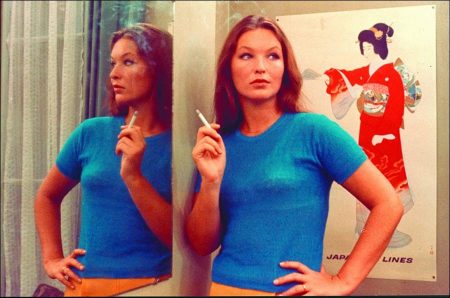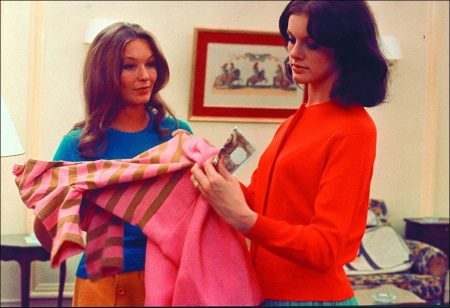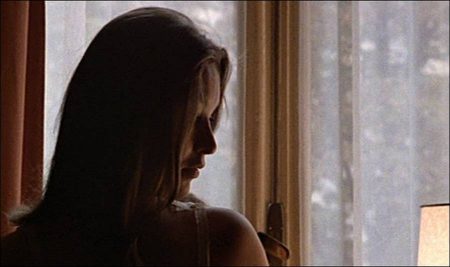Two or Three Things I Know About Her movie storyline. The feminine pronoun in the title of this film from Jean-Luc Godard refers to both a French housewife and the city of Paris, as each are changed in fundamental ways by the growth of consumer culture in Europe. Juliette Janson (Marina Vlady) lives with her husband and two children in a high-rise apartment block in Paris.
Juliette and her family used to live in a working class community on the outskirts of town, but they’ve been drawn into the city in search of a higher standard of living, reflected in their new home and their desire for more of the latest consumer goods. Juliette’s husband can barely support the household on his salary, so she taken to working as a prostitute without his knowledge to help pay the bills.
Deux ou Trois Choses Que Je Sais d’Elle (aka 2 or 3 Things I Know About Her) follows Juliette over the course of a seemingly ordinary day as she looks after the kids, takes care of her husband and plies her trade when she has the chance. Shot simultaneously with Made In U.S.A., 2 or 3 Things I Know About Her found Godard moving away from his fascination with American genre cinema while exploring radical politics and alternatives to conventional narrative frameworks; it proved to be one of his last films to reach a large audience in theaters.
Two or Three Things I Know About Her (French: Deux ou Trois Choses que je Sais d’Elle) is a 1967 French New Wave film directed by Jean-Luc Godard, one of three features he completed that year. Like the other two (Week End and La Chinoise), it is considered both socially and stylistically radical. Village Voice critic Amy Taubin considers it one of the greatest achievements in filmmaking.

About the Film
The film does not tell a story so much as present an essay-like study of Godard’s view of contemporary life; Godard wrote that “I wanted to include everything: sports, politics, even groceries. Everything should be put in a film”. Godard narrates the film in a whispered voice-over that discusses his fears to the audience about the contemporary world, including the Vietnam War. The film often cuts to various still shots of bright consumer products and ongoing construction.
Like many of the director’s works, the film does not follow the narrative arc of conventional cinema, with an introduction, conflict and resolution. Instead, it presents 24 hours in the sophisticated but empty life of Juliette Jeanson (Marina Vlady), a seemingly bourgeois married mother, part of whose life involves prostitution. Juliette begins her day dropping off her screaming child to a man who has a flourishing business doing childcare for call girls. Her generally uneventful daily routine of shopping, housework and child-rearing is interspersed with assignations with clients. All of the film’s sexual interplay is banal instead of erotic, and one client, an American wearing a shirt with his country’s flag, demands the women he has hired wear airline shopping bags over their heads.
Though there was a script, there are many moments in which the cast breaks the fourth wall, looking into the camera and giving seemingly random monologues about what they think about life and themselves. Vlady and other actors wore earpieces through which the director asked surprise questions, often catching Vlady off-guard because she was required to give spontaneous answers that were appropriate to her character.
Jean-Luc Godard and Themes
Juliette lives in one of many supposedly-luxurious high-rises being erected in the banlieues (suburbs) of Paris. While meant to provide housing to families working in the growing capital during the prosperous post-war years, Godard sees the banlieues as the infrastructure for promoting a value system based on consumerism, a term he equates with prostitution itself: a consumerist society, he explained during a debate on the 25 October 1966 edition of Zoom, demands a work force living in regimented time and space, forced to work jobs they don’t like, “a prostitution of the mind.”
Around the time he was making the film, Godard appeared on the television program Zoom to debate with government official Jean St. Geours, who predicted that advertising would increase as the basic impulse of the French society at the time was to increase its standard of living. Godard explained that he saw advertisers as the pimps who enslave the women to the point where they give their bodies without compunction, because they’ve been convinced that what they can buy has more potential to bring happiness than does the loving enjoyment of sex.
Like many of Godard’s films from the mid-1960s onward, 2 or 3 Things demonstrates his growing disenchantment with America.[citation needed] This contrasts with his earlier French New Wave (Nouvelle Vague) films like Breathless (1960), which make admiring references to American cinema and actors.
Two or Three Things I Know About Her (1967)
Directed by: Jean-Luc Godard
Starring: Joseph Gehrard, Marina Vlady, Roger Montsoret, Raoul Lévy, Jean Narboni, Juliet Berto, Helena Bielicic, Marie Bourseiller, Marie Cardinal, Jean-Luc Godard, Blandine Jeanson, Joseph Gehrard, Robert Chevassu, Yves Beneyton
Screenplay by: Catherine Vimenet, Jean-Luc Godard
Cinematography by: Raoul Coutard
Film Editing by: Françoise Collin, Chantal Delattre
Costume Design by: Gitt Magrini
MPAA Rating: None.
Distributed by: New Yorker Films
Release Date: March 17, 1967 (France)
Views: 225


